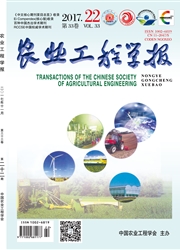

 中文摘要:
中文摘要:
纳米炭材料由于其独特的结构和物理化学性质被广泛地应用到材料科学、能源、环境修复以及制药等领域。随着纳米炭材料生产和使用的不断增加,纳米炭材料将不可避免地被释放到环境中,并对环境中的各种植物以及作物造成未知的影响。近年来,将纳米炭材料应用到农业领域,考察纳米炭材料对作物的影响成为新的研究热点。该文综述了各类纳米炭材料(包括炭纳米管、富勒烯、炭纳米洋葱和石墨烯等)对作物的生长影响,现有研究表明,各类纳米炭材料对作物种子的萌发和幼苗根茎的生长、作物产量和品质以及作物的抗逆性方面造成影响;此外,施加含纳米炭材料的肥料对作物的产量品质,肥料的利用率也造成影响,但其中的影响机理还不完全清楚,仍有待于进一步研究。研究纳米炭材料与作物的相互作用关系,可为纳米炭材料应用于农业,促进增产提供新的思路和指导,因而具有重要的意义。
 英文摘要:
英文摘要:
Carbon nano-materials(CNMs) due to their unique structure and physicochemical properties are being used in the field of material science, energy, environmental remediation and medicine. As the production and application of CNMs continues to expand, CNMs will be inevitably discharged into the environment and generate unknown impacts on plants and crop species. Presently, more and more studies on CNMs are concentrated around their interactions and distribution within plants especially crops. In this paper, we review the literature about impacts on plant growth generated by four types of CNMs(carbon nanotube, fullerene, carbon nano-onions and graphene). Previous studies reveal that CNMs-exposed plants exhibit different response to stress, including seed germination, root and stem growth, biomass yields and nutritional quality. In some cases, CNMs are shown to be helpful in seed germination, root growth, photosynthesis and crop production, such as the use of fullerenes in bitter melon, the effect of graphene oxide on red bean germination, the growth promoters effects of carbon nano-onions for gram plants, the ability of carbon nanotubes to enhance growth in tobacco cells, increase the seed germination and growth of tomato plants and cause root enhancement in wheat plants. Further mechanisms investigation of CNMs on plants showed that the carbon nanotubes could increase the protein expression of water channel, as tracheal elements of the xylem vessels are responsible for water channel transport in plants, results in the overall enhanced growth of plants. While the CNMs are useful to increase the crop production and fruit manifold, but there are many other aspects, CNMs are known to be phytotoxic and harmful. Reports show that graphene significantly inhibited plant growth and biomass levels. It also decreased the number and size of leaves in a dose-dependent manner and caused oxidative stress-induced necrosis in cabbage, tomato and red spinach seeds during development. The transmission of CNMs to the next gener
 同期刊论文项目
同期刊论文项目
 同项目期刊论文
同项目期刊论文
 期刊信息
期刊信息
